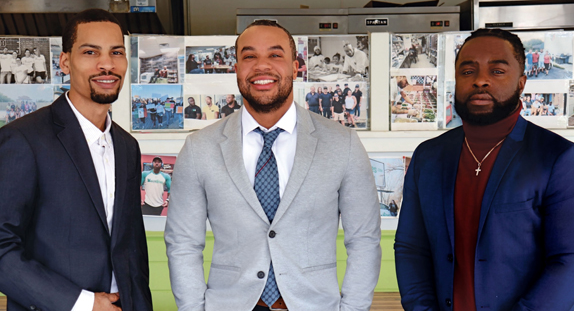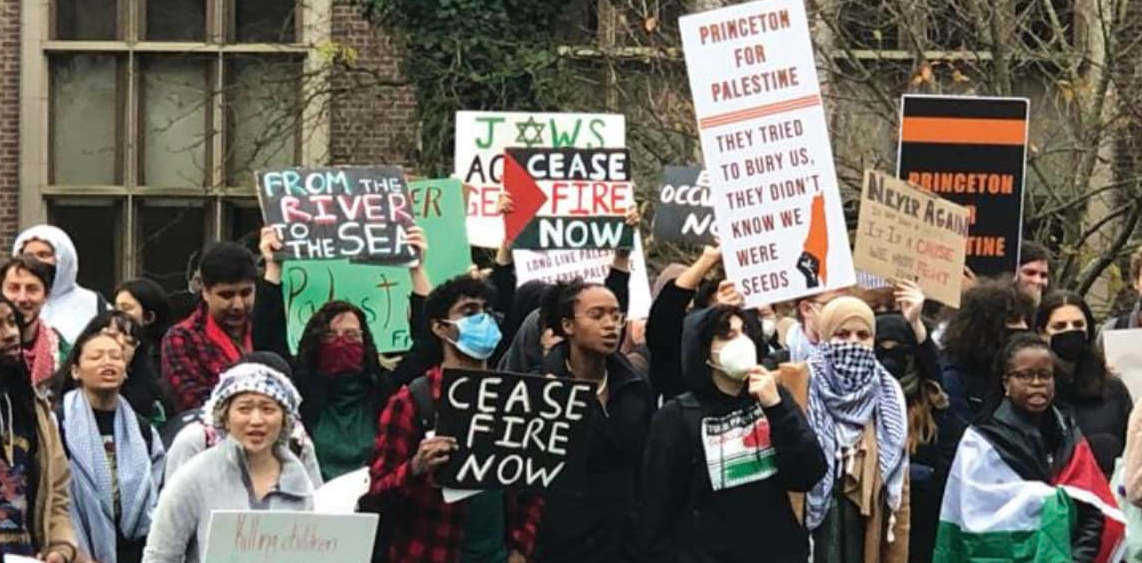He created Art Start’s Hip-Hop Project, an outreach program which connects troubled teens to music industry professionals with the goal of producing their own rap album reflecting real-life issues.
ENTREPRENEUR OF THE DAY
Chris “Kazi� Rolle was born in Nassau, Bahamas and abandoned by his mother as a young child. He grew up in foster care and orphanages before coming to New York at the age of fourteen to reconnect with his biological mother.
A turbulent reunion led to his living homeless on the streets of Brooklyn where he began hustling at night to survive though he did continue to stay in school.
In 1996, after graduating from PSRC Performing Arts High School, Kazi began writing, directing and acting with an urban theatre company called Tomorrow’s Future, fusing hip-hop and drama to relate tales of everyday experiences in the inner city.
Three years later, he created Art Start’s Hip-Hop Project, an outreach program which connects troubled teens to music industry professionals with the goal of producing their own rap album reflecting real-life issues.        Â
He’s also the architect of Momentum, a hip-hop music label that puts the emphasis on the education and empowerment of its artists. Plus, he’s a co-founder of A.P.E.X., a non-profit organization that hosts monthly college preparation workshops and offers a tour of Historically Black Colleges and Universities.
Kazi has been featured by Oprah Winfrey on a show with the theme “People Who Are Using Their Lives,� as he now travels around the country as both a motivational speaker and a performer. Presently, he’s working on his highly anticipated debut album, “Many Faces.�
Here, he talks about The Hip Hop Project, an uplifting bio-pic which chronicles his overcoming the odds of an orphan surviving on the streets and his then going on to serve as a mentor to other unfortunate kids who find themselves in equally-challenging predicaments.
BSN: What’d you think of The Hip Hop Project?
Kazi: I love the film. I love it!
BSN: Do you think it gives the audience an accurate idea of what your program is trying to accomplish?
Kazi: Definitely.
BSN: Hey, you grew up in the Bahamas until you were about 14. How come you don’t have a West Indian accent?
Kazi: You know what I think it was? It was the fact that I’ve always dreamed about coming to America, and I used to rap as a little kid, mimicking all the rappers from America. And there was no Bahamian community in the Bahamas that I was aware of or connected to. I think constantly being around Americans, I just wanted to talk like them, I guess, and maybe lose the accent quicker. And I didn’t go home for a very long time.
BSN: Speaking of home, probably, the most poignant scene in the movie is your reunion with your mom after many years of being estranged. You obviously were eager to bond with her, but she still seemed somewhat distant. How is your relationship with her today?
Kazi: It’s good, it’s evolving. I can walk into the house, if I’m ever around on a holiday, and get a nice hug. We talk once in a while, though I’m very busy, and so is she. The relationship has evolved a whole lot since that point, and it continues to evolve.
BSN: At the end of the movie we learn that you’re no longer running the day-to-day operations of the Hip Hop Project. That must be a big loss, because you were its driving force.
Kazi: I’m still on the board. We’re working towards having the program be its own independent organization, aside from Art Start.
BSN: So, what are you up to, then?
Kazi: I just finished my album, “Many Faces,� and I’m working on getting it out there.
BSN: Who is your album with, an independent label?
Kazi: I’m talking to a few different distributors. But my main focus right now is trying to get people to see the movie. After that, I’ll make some decisions.
BSN: In the film, you stress the idea of writing lyrics which honestly reflect what’s going on in your life. This ought to be excellent timing given the recent backlash against gangsta rap in the wake of the Don Imus controversy.
Kazi: Yeah, I guess it might be divine intervention, but I also think things just go out of style. Some of those rappers will continue to sell, but people are more open and are looking for more from hip-hop right now, and we’re ready to feed that appetite. I couldn’t have planned it any better.
BSN: In the film, we see you fall in love with Kheperah. When are you two lovebirds going to tie the knot?
Kazi: Well, it’s been so crazy, we’ve got to get past this tsunami of attention and just really spend some time with each other, before we can, like we say, jump the broomstick.
BSN: Is your fiancée still working in the music industry?
Kazi: Nah, right now she’s working on a book and on an album and she’s seeking some opportunities as a motivational speaker. And she’s working with me to promote this film.
BSN: The film focuses on couple of your protégés, including Princess, who was pregnant. How’s she doing, and what’d she have, a boy or a girl?
Kazi: She had a girl. Her name is Dream. Princess is doing great. She’s running the program, and she actually just finished a book, “Me, Myself and I� which is about lessons that she learned being a young mother. She continues to run the program and she’s also been out on the road promoting the film and our new CD which just dropped yesterday. It’s the soundtrack to the film.
BSN: How many different performers from the program are there on the soundtrack?
Kazi: Ten. We’re getting ready to do a performance tour this summer. So, we’re looking forward to that. We’re forming a Wu-Tang Clan type of collective to continue to spread this message of hope and healing through hip-hop.
BSN: And how is Cannon, the other kid prominently featured in the documentary, doing? He was very broken up when his mother, who had Multiple Sclerosis, passed away while you were making the movie.
Kazi: He’s doing better now. He’s actually does a lot of the production on my album, and he continues to produce for the group, and for other artists in the music industry. He’s also an editor over at AOL Music, and he does a lot in the community to raise awareness and funds for such sickness as AIDS and MS. I’m very, very proud of him.
BSN: What was it like being homeless at such a young age, and how did you survive on the streets?
Kazi: I give thanks for the attention of the movie, but there’s so many people going through the same process. It was definitely hard living out there on the streets, but I always had angels and people trying to help me out. For a long time, anywhere I laid my hat was my home. Though the streets were pulling me in one direction, the angels were pulling me the other way. And I think the angels just pulled harder. Now, I’ve got my own place, and I’m enjoying life.
BSN: Are you still in Brooklyn?
Kazi: Yes, sir, Crown Heights!
BSN: Do you know where Medgar Evers College is? That’s my old stomping grounds. Nostrand Avenue… President Street…
Kazi: Yeah, I’m right up the block. I’m on Sterling. I do college preparation workshops which culminate in a one week-long college tour. Medgar Evers is the only historically-black college in New York City, so we usually do our workshops there. Did you attend that school?
BSN: Yeah, but I went there when it was a high school. What advice do you have for anyone who wants to follow in your footsteps?
Kazi: For folks living in tough situations, like foster care, or the homeless, I’d say, “Try to surround yourself with people who care.� There ARE people out there. Sometimes, it won’t be blood relatives, but you’ve got to surround yourselves with people who tell you that you can be somebody, and that, whatever you need, they will support you. And for folks who want to break into the music industry, I’d say, “Just be honest in your music.� Write music that comes from your heart… that represents you. Don’t let the radio dictate to you who you should be. Use the internet as a way to find your fan base. Use places like MySpace and FaceBook to promote your stuff right there online. That’s the future of music.
BSN: As I’m speaking to you on the phone, you’re constantly getting interrupted by fans. Are people already noticing you from the movie?
Kazi: Yes, sir! Man, when I walk down the street, I get hugged, and people are asking for autographs. It’s beautiful, but the most important thing is that people become inspired to give back.
BSN: What’s it like to have Bruce Willis, Queen Latifah and Russell Simmons behind your project?
Kazi: Honestly, I feel honored and very blessed. I appreciate the opportunity. And it validates my stepping out and doing something different from a lot of my peers in the music game, because I didn’t know whether people would like it or understand. But along the way, people said, “Wow! This is a great thing you’re doing, and anything you need, I want to help you.�
BSN: Is there any question you always wished a reporter would ask you, but nobody ever asks.
Kazi: Yeah, if you had the whole world listening, what would you have to say?
BSN: Okay, if you had the whole world listening, what would you have to say?
Kazi: I’d say be inspired to take time out to give back to another human being, because you’ll be surprised what you get back in return. I’d also say go and see this movie, because you can make a difference when you buy a ticket, since 100% of the profits for this film will go to organizations working with young people.
BSN: Won’t you feel bad when the picture makes a lot of money and you don’t get a big cut?
Kazi: No, I’m a resilient person I’m always going to make a way. Because we’re only on this planet for a limited time, it’s more important to me that my idea live on past me. If I can create a self-sustaining program, then I’m good, my legacy’s here. Having people like Bruce Willis supporting what I’m doing is greater than money. Money can only last for a little while, but the respect and admiration and love that I get from people will last for a lifetime.
To subscribe to or advertise in New York’s leading Pan African weekly investigative newspaper, please call (212) 481-7745 or send a note to [email protected]
Â
“Speaking Truth To Empower.�











